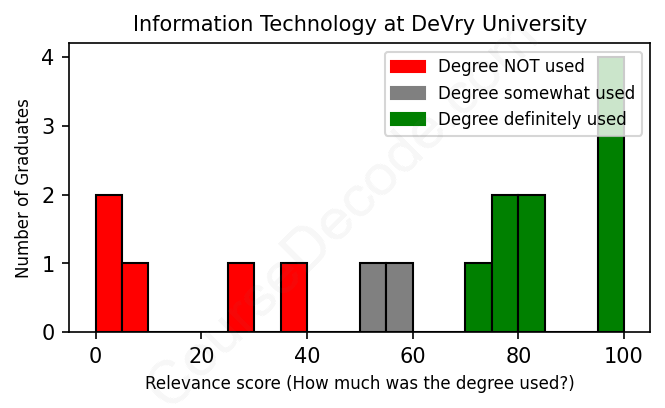
First, some facts. Of the Information Technology graduates from DeVry University we've analyzed , here's how many have used (or NOT used) their degree in their career:

These are estimates based on AI analysis of 16 LinkedIn profiles (see below).
The verdict? Below average. Overall, with an average relevance score of 60%, Information Technology graduates from DeVry University have a lower likelihood (-7%) of finding work in this field compared to the average graduate across all fields:
And for comparison, here's the chart for all profiles we've looked at across all degrees.
Also, after graduating, only 6% of these graduates have pursued further education other than another Bachelor's degree (such as a Masters degree or other), compared to the average across all profiles of 35%. This suggests a Bachelors degree is enough for most Information Technology graduates, and it's normal to look for work straight after graduation.
See the details:
|
Relevance score: 83% We think this person has gone into a career highly relevant to their degree. We think this person has gone into a career highly relevant to their degree.
DEGREE INFOGraduated in 2011 from DeVry University with a Bachelor of Science - BS in Information Technology. No other secondary education since. JOB HISTORY SINCE GRADUATIONIT Systems Administrator I Metropolitan Water District of Southern California Jan 2012 - Apr 2022 IT Infrastructure Analyst  Metropolitan Water District of Southern California Feb 2012 - Apr 2022 Contract Account Manager | CFO | Outreach Manager  Ontario Ranch Nurse Staffing Nov 2022 - Present Founder  [NAME REMOVED] Innovations LLC. Jan 2017 - Present Founder | Chairman  Forge Core Oct 2023 - Present ABOUTI'm an entrepreneur with a deep love for innovation. My journey began a decade ago at the Metropolitan Water District, where I assisted the Database Administrative team. It was during this time that I discovered my true passion for innovation and entrepreneurship. Taking a leap of faith, I dedicated myself to making a lasting impact on highway and road safety, as well as safety in general.If you share my enthusiasm for technology and safety, I'd love to connect over a coffee and explore the possibilities. Let's make a positive change together. |
The top 10 most common jobs done by the graduates we've analyzed (ranked most common to least) are:
People who graduated with a degree in Information Technology from DeVry University have taken on quite a variety of jobs, but most of them seem to fall into a few common categories. A bunch of grads have gone into roles like IT Systems Administrator, Middleware Administrator, and Technical Support Specialist. These positions are definitely relevant to the skills you gain in an Information Technology program because they involve working directly with technology, systems, and infrastructure. For example, roles like Enterprise Infrastructure Manager and Senior Data Platform Engineer show that many graduates are leveraging their degrees to manage and analyze IT systems effectively.
On the flip side, there’s a notable number of graduates who have pursued careers that aren't strongly tied to their Information Technology background. Positions in sales, management, or even entirely different paths like life insurance and ride attending pop up fairly often. These roles don't typically require the advanced technical expertise or specific knowledge one would expect to utilize from an IT degree, leading to a mix of relevance among job placements. Overall, while many DeVry graduates have jobs that align directly with their degree, there’s also a significant chunk venturing into fields that, while interesting, don't fully engage their technical training. So, it's a mixed bag, with strong opportunities in IT-related fields but also some unexpected career paths too!
Here is a visual representation of the most common words in job titles for Information Technology graduates (this is across all Information Technology graduates we've analyzed, not just those who went to DeVry University):

When looking at the career trajectories of graduates from DeVry University with degrees in Information Technology, it seems that many of them have found a decent footing in the tech industry, especially in their early years after graduation. Typically, right after graduation, a lot of these guys start off as IT support specialists, system administrators, or analysts—roles that are pretty much stepping stones into more advanced positions. For instance, you’ve got graduates landing jobs as IT Systems Administrators or Technical Support Specialists, which are solid entry-level positions. Within just a few years, many of them make their way up the ladder into more senior roles, like IT Infrastructure Analysts or Solutions Architects, which really show a nice progression in responsibility and skill development.
Fast forward five to ten years, and you can see some interesting trends. Many graduates who started in technical roles often end up in managerial or specialized positions. For example, some have advanced to Technical Services Managers or even found their own companies, which indicates a pretty good trend of entrepreneurship among some graduates. However, it’s not perfect for everyone; there are a few who have wandered off the direct IT path—like one who became a Life Insurance Agent or others who ended up in unrelated sales and support roles. Overall, while there are some cases of graduates not staying strictly in the tech field, most seem to be thriving and pursuing meaningful careers within Information Technology and its related disciplines. It's definitely a mixed bag, but there’s a strong presence of success stories here for those who stick to their IT roots!
Honestly, a Bachelor’s degree in Information Technology can be a mix of challenging and manageable, especially at a place like DeVry University. It tends to be a bit easier than some traditional programs because the coursework is often practical and hands-on, focusing on real-world applications of tech skills. You'll dive into subjects like networking, cybersecurity, and databases, but the curriculum is designed to be digestible for students who may not have a super strong tech background. That said, if you hit the books, stay organized, and put in some effort, you’ll probably find it doable. Just be prepared to get your hands dirty with projects and maybe some late-night studying when deadlines approach!
Most commonly, in the LinkedIn profiles we've looked at, it takes people 3 years to finish a Bachelor degree in Information Technology.
Looking at these DeVry grads, it seems like a few of them are doing pretty well, especially those in IT and technical management roles, like the Technical Services Manager and the Sr. Solutions Architect. Positions in cybersecurity and senior technical roles generally pay quite a bit, so they're likely earning decent salaries. Some of the earlier graduates have had stable careers at organizations like the Metropolitan Water District, which may offer decent pay and benefits as well. However, not everyone’s been as fortunate; one grad has been out of work since 2015, indicating that the job market can be tough. Overall, if they stayed in demand fields and leveraged their skills, many seem to have found ways to make some good money.
Here is a visual representation of the most common words seen in the "about" section of LinkedIn profiles who have a Bachelor degree in Information Technology (this is across all Information Technology graduates we've analyzed, not just those who went to DeVry University). This may or may not be useful:

Here are all colleges offering a Bachelor degree in Information Technology (ordered by the average relevance score of their Information Technology graduates, best to worst) where we have analyzed at least 10 of their graduates: